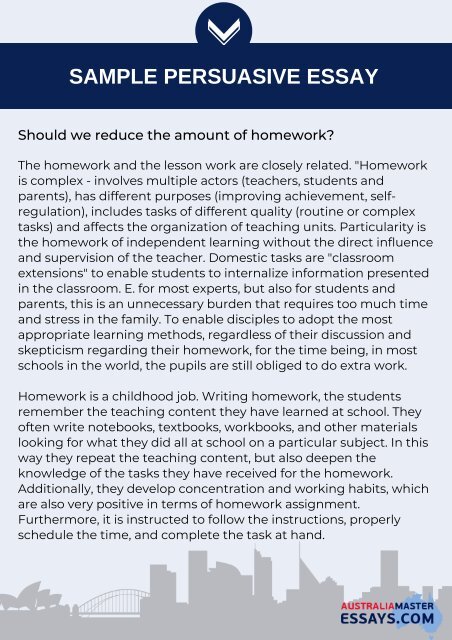Should we reduce the amount of homework?
Here you may find the tips on writing a sample persuasive essay: https://www.australiamasteressays.com/
Here you may find the tips on writing a sample persuasive essay: https://www.australiamasteressays.com/
Create successful ePaper yourself
Turn your PDF publications into a flip-book with our unique Google optimized e-Paper software.
SAMPLE PERSUASIVE ESSAY<br />
<strong>Should</strong> <strong>we</strong> <strong>reduce</strong> <strong>the</strong> <strong>amount</strong> <strong>of</strong> <strong>homework</strong>?<br />
The <strong>homework</strong> and <strong>the</strong> lesson work are closely related. "Homework<br />
is complex - involves multiple actors (teachers, students and<br />
parents), has different purposes (improving achievement, selfregulation),<br />
includes tasks <strong>of</strong> different quality (routine or complex<br />
tasks) and affects <strong>the</strong> organization <strong>of</strong> teaching units. Particularity is<br />
<strong>the</strong> <strong>homework</strong> <strong>of</strong> independent learning without <strong>the</strong> direct influence<br />
and supervision <strong>of</strong> <strong>the</strong> teacher. Domestic tasks are "classroom<br />
extensions" to enable students to internalize information presented<br />
in <strong>the</strong> classroom. E. for most experts, but also for students and<br />
parents, this is an unnecessary burden that requires too much time<br />
and stress in <strong>the</strong> family. To enable disciples to adopt <strong>the</strong> most<br />
appropriate learning methods, regardless <strong>of</strong> <strong>the</strong>ir discussion and<br />
skepticism regarding <strong>the</strong>ir <strong>homework</strong>, for <strong>the</strong> time being, in most<br />
schools in <strong>the</strong> world, <strong>the</strong> pupils are still obliged to do extra work.<br />
Homework is a childhood job. Writing <strong>homework</strong>, <strong>the</strong> students<br />
remember <strong>the</strong> teaching content <strong>the</strong>y have learned at school. They<br />
<strong>of</strong>ten write notebooks, textbooks, workbooks, and o<strong>the</strong>r materials<br />
looking for what <strong>the</strong>y did all at school on a particular subject. In this<br />
way <strong>the</strong>y repeat <strong>the</strong> teaching content, but also deepen <strong>the</strong><br />
knowledge <strong>of</strong> <strong>the</strong> tasks <strong>the</strong>y have received for <strong>the</strong> <strong>homework</strong>.<br />
Additionally, <strong>the</strong>y develop concentration and working habits, which<br />
are also very positive in terms <strong>of</strong> <strong>homework</strong> assignment.<br />
Fur<strong>the</strong>rmore, it is instructed to follow <strong>the</strong> instructions, properly<br />
schedule <strong>the</strong> time, and complete <strong>the</strong> task at hand.
<strong>Should</strong> <strong>we</strong> <strong>reduce</strong> <strong>the</strong> <strong>amount</strong> <strong>of</strong> <strong>homework</strong>?<br />
2<br />
Competencies are what <strong>the</strong>y will need in <strong>the</strong>ir daily lives. By doing<br />
<strong>homework</strong>, students are preparing for <strong>the</strong> next school day. It is very<br />
important for children and parents to find adequate time to write<br />
<strong>homework</strong>. This should be <strong>the</strong> time when all <strong>the</strong> physiological needs<br />
<strong>of</strong> <strong>the</strong> child are met and <strong>the</strong>y have enough concentration to solve<br />
<strong>the</strong> tasks before it. Forcing a child to write <strong>homework</strong>, when she<br />
does not want to do it for some justified reasons, parents demotivate<br />
a child, and sometimes frustration and conflict arise because <strong>of</strong> <strong>the</strong><br />
lack <strong>of</strong> understanding bet<strong>we</strong>en <strong>the</strong>m. That is why nei<strong>the</strong>r <strong>the</strong> child<br />
nor <strong>the</strong> parents receive anything, only increases <strong>the</strong> mutual<br />
intolerance towards <strong>the</strong> domestic task, which certainly should not<br />
and should come. Many children, who have no motivation to write<br />
<strong>homework</strong>, are insecure in <strong>the</strong>mselves and <strong>the</strong>ir ability to achieve<br />
success in anything that has to do with school. They need to be<br />
encouraged and supported by <strong>the</strong> people <strong>the</strong>y are most concerned<br />
about, and <strong>the</strong>y are <strong>the</strong>ir parents.<br />
Writing <strong>homework</strong> assigns students learn how to work<br />
independently. In case <strong>of</strong> difficulties in solving school assignments,<br />
students ask for help from teachers or o<strong>the</strong>r students. It is <strong>of</strong>ten <strong>the</strong><br />
task and <strong>the</strong> default that <strong>the</strong> students do not solve <strong>the</strong>m individually,<br />
but in a pair or group. That is why <strong>the</strong> <strong>homework</strong> is also conceived<br />
that students are usually obliged to solve it independently, without<br />
relying on <strong>the</strong> help <strong>of</strong> o<strong>the</strong>rs. Ho<strong>we</strong>ver, <strong>the</strong>ir parents <strong>of</strong>ten fall into<br />
that trap, helping <strong>the</strong>ir students solve <strong>the</strong>ir tasks in ways <strong>the</strong>y should<br />
not. Parents sometimes have no patience to wait and see how <strong>the</strong>ir<br />
child is struggling with <strong>the</strong>ir job. Thinking to help this child, some<br />
parents decide to complete <strong>the</strong>ir task alone. Ho<strong>we</strong>ver, <strong>the</strong>ir purpose<br />
is lost. "Children will not be able to practice and experiment with<br />
<strong>the</strong>ir ability, to learn, and to demonstrate whe<strong>the</strong>r <strong>the</strong>y truly<br />
understand <strong>the</strong> teaching content (or some <strong>of</strong> its parts).
<strong>Should</strong> <strong>we</strong> <strong>reduce</strong> <strong>the</strong> <strong>amount</strong> <strong>of</strong> <strong>homework</strong>?<br />
3<br />
Above all, it also loses a very important goal, which is to encourage<br />
<strong>the</strong>ir own children to grow up by developing a critical spirit and selfexpression<br />
ability. The role <strong>of</strong> parents is to support <strong>the</strong>ir children, to<br />
explain what <strong>the</strong>y do not understand, as <strong>we</strong>ll as to <strong>the</strong> very purpose<br />
<strong>of</strong> <strong>homework</strong>, but not to work for <strong>the</strong>m. With encouragement and<br />
support, parents show <strong>the</strong> importance <strong>of</strong> writing <strong>homework</strong>, and<br />
<strong>the</strong>y are also familiar with <strong>the</strong> educational content that <strong>the</strong>ir children<br />
learn and <strong>the</strong> degree <strong>of</strong> <strong>the</strong>ir progress. Successful fulfillment <strong>of</strong> <strong>the</strong><br />
obligation to <strong>the</strong> students provokes a sense <strong>of</strong> satisfaction, and <strong>the</strong><br />
motivation towards <strong>the</strong> upcoming school obligations is increasing.<br />
Additionally, doing <strong>homework</strong>, students learn to use literature.<br />
Namely, <strong>the</strong>re is a lot <strong>of</strong> <strong>homework</strong> that needs to be studied in books<br />
or on <strong>the</strong> internet. Ho<strong>we</strong>ver, when seeking information on <strong>the</strong><br />
Internet, students should know how to distinguish bet<strong>we</strong>en reliable<br />
and inaccurate sources <strong>of</strong> information. Parents and teachers play a<br />
key role in routing and teaching children about safe and reliable use<br />
<strong>of</strong> computers and <strong>the</strong> internet as <strong>we</strong>ll as o<strong>the</strong>r media. These are <strong>the</strong><br />
tasks that require <strong>the</strong> research <strong>of</strong> different media <strong>of</strong>ten given to<br />
students as an introduction to <strong>the</strong> new teaching content <strong>the</strong>y will<br />
learn in <strong>the</strong> upcoming classes.<br />
"Homework assignments point out, among o<strong>the</strong>r things, that due to<br />
<strong>the</strong> overpayment <strong>of</strong> <strong>the</strong> curriculum <strong>the</strong>re is a need for additional<br />
work at home, that <strong>the</strong>re is not enough time for <strong>the</strong> exercise and <strong>the</strong><br />
repetition <strong>of</strong> <strong>the</strong> lesson, that full individualization can only be carried<br />
out at home. By improving <strong>the</strong> financial conditions in <strong>the</strong> school, <strong>the</strong><br />
number <strong>of</strong> pupils in <strong>the</strong> class would be <strong>reduce</strong>d, and thus <strong>the</strong><br />
teachers could better devote <strong>the</strong>mselves to <strong>the</strong>ir students so <strong>the</strong>y<br />
would not have so much <strong>homework</strong>. Due to <strong>the</strong> overwhelming<br />
number <strong>of</strong> school subjects and <strong>the</strong> overlap <strong>of</strong> <strong>the</strong> curriculum,<br />
students <strong>of</strong>ten experience overload.
<strong>Should</strong> <strong>we</strong> <strong>reduce</strong> <strong>the</strong> <strong>amount</strong> <strong>of</strong> <strong>homework</strong>?<br />
4<br />
Contrary to positive views, <strong>we</strong> can see <strong>homework</strong> as a kind <strong>of</strong><br />
coercion. The <strong>homework</strong> assigns pupils overwhelmed by <strong>the</strong>ir<br />
obligations and exceeds <strong>the</strong>ir psychophysical abilities. After many<br />
years <strong>of</strong> schooling, students have been forced to spend part <strong>of</strong> <strong>the</strong>ir<br />
time in solving <strong>the</strong>ir <strong>homework</strong>. Why should <strong>the</strong> children be asked to<br />
do o<strong>the</strong>r shifts? "Most <strong>of</strong>ten, <strong>the</strong>y are more <strong>homework</strong> assignments a<br />
day, which are <strong>of</strong>ten too overwhelming and students usually need a<br />
lot <strong>of</strong> time to fulfill <strong>the</strong>m. Time is <strong>of</strong>ten extended if <strong>the</strong> students do<br />
not understand <strong>the</strong> <strong>homework</strong>, and this is ano<strong>the</strong>r important reason<br />
for her termination. Pupils should be motivated to learn and do as<br />
much as possible at school, and teachers should not only check <strong>the</strong><br />
assignments but may also provide feedback. Namely, <strong>the</strong> <strong>homework</strong><br />
can be overwhelming and incomprehensible for individuals, and<br />
sometimes for all students. Parents are <strong>of</strong>ten not competent enough<br />
to adequately help <strong>the</strong>ir children. In such situations, frustration <strong>of</strong>ten<br />
occurs with students and parents, and sometimes with tears.<br />
Students experience a feeling <strong>of</strong> po<strong>we</strong>rlessness, which is certainly<br />
not motivating for <strong>the</strong>ir feeling <strong>of</strong> <strong>the</strong>ir own abilities and values.<br />
School responsibilities deprive <strong>the</strong> leisure time that parents and<br />
students could spend toge<strong>the</strong>r, and time spent with <strong>the</strong> family is <strong>of</strong><br />
outstanding importance for each child's upbringing. In addition to<br />
having a good time with <strong>the</strong> family, students should have enough<br />
time to play, socialize with friends and stay in <strong>the</strong> fresh air, and by<br />
writing <strong>the</strong>ir <strong>homework</strong>, none <strong>of</strong> <strong>the</strong>se activities is possible. From <strong>the</strong><br />
earliest age onwards, students learn about <strong>the</strong> world <strong>of</strong> adults, faced<br />
with stress and dissatisfaction due to lack <strong>of</strong> time to meet <strong>the</strong>ir own<br />
needs and desires. As for <strong>homework</strong> on <strong>we</strong>ekends or holidays,<br />
"children are tired and unmotivated, and <strong>the</strong> daily rhythm is lost and<br />
stretched. Domestic task is perceived as an injustice because it deny<br />
<strong>the</strong>m <strong>the</strong> feeling <strong>of</strong> completeness <strong>of</strong> <strong>the</strong> <strong>we</strong>ekend or holiday. Also,<br />
proponents <strong>of</strong> abolishing <strong>homework</strong> stress that it <strong>of</strong>ten has no<br />
purpose.
<strong>Should</strong> <strong>we</strong> <strong>reduce</strong> <strong>the</strong> <strong>amount</strong> <strong>of</strong> <strong>homework</strong>?<br />
5<br />
This is evidenced by <strong>the</strong> claims that <strong>the</strong> <strong>homework</strong> assigns students<br />
sometimes overlapping each o<strong>the</strong>r or that parents or o<strong>the</strong>r<br />
householders work for <strong>the</strong>m instead. Because <strong>of</strong> this, <strong>the</strong> teachers<br />
have no real picture that <strong>the</strong> students have done independently at<br />
home, and what else has been done by someone else instead.<br />
Fur<strong>the</strong>rmore, some experts are strongly opposed to <strong>the</strong> types <strong>of</strong><br />
<strong>homework</strong> assigned to most <strong>of</strong> our schools because such tasks are<br />
not useful to those who do not understand it, and for students who<br />
have already mastered certain skills is a waste <strong>of</strong> time. If <strong>the</strong>y are<br />
already given, <strong>homework</strong> should be individualized tasks that meet<br />
<strong>the</strong> needs and interests <strong>of</strong> particular students, and if <strong>the</strong>y are<br />
intended to give <strong>the</strong> same tasks to all students, <strong>homework</strong> should<br />
not be. Additionally, assignment <strong>of</strong> tasks that only require<br />
reproductive repetition, such as learning definitions and rules <strong>of</strong><br />
memorization, is also not desirable because it does not develop <strong>the</strong><br />
student's ability to do so and <strong>the</strong> contents are kept in memory for a<br />
very short time.<br />
For now, while <strong>the</strong>re are no better working conditions yet, I suggest<br />
teachers instruct students to choose whe<strong>the</strong>r and how much<br />
<strong>homework</strong> <strong>the</strong>y will write outside school. Of course, teachers can<br />
work to create interesting and useful <strong>homework</strong> for students, and<br />
some <strong>of</strong> <strong>the</strong>m will probably be interested in additional work at<br />
home.
References:<br />
6<br />
Milbourne, Linda & Haury, David. (1999). Why Is Homework<br />
Important?. The ERIC Review. 62, p. 11 - 12.<br />
Hayward, J. M. (2010). The Effects <strong>of</strong> Homework on Student<br />
Achievement. Education and Human Development Master's<br />
Theses, State University <strong>of</strong> New York College at Brockport.<br />
Costley, K. C. (2013). Does Homework Really Improve Achievement?.<br />
Arkansas Tech University





